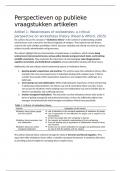Samenvatting
Perspectieven op publieke vraagstukken (USG5060) samenvatting alle artikelen
Artikel 1: Weaknesses of wickedness: a critical perspective on wickedness theory (Head & Alford, 2015) Artikel 2: Wicked Problems: Implications for Public Policy and Management (Noordegraaf et al., 2019) Artikel 3: Core Concepts and Key Ideas for Understanding Public Sector Organizational Network...
[Meer zien]




